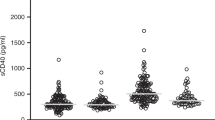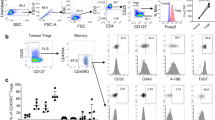Abstract
This study prospectively correlated the level of expression of CD55 on tumours with 7-year survival in 136 colorectal cancer patients. Patients with tumours expressing high levels of CD55 had a significantly worse survival (24%) than patients with low CD55 levels (50%, p<0.02). A similar difference was seen for patients (Duke's B or C) with a high risk of recurrence (29% vs 58%, p<0.05). Furthermore, there was a progressive deterioration in prognosis with increasing antigen expression (p=0.01). It remains unclear if CD55 is overexpressed by tumours to protect them from complement or if it is related to the recent observation that CD55 is a ligand for the T-cell activation antigen CD97. However, it is a marker of aggression, as colorectal cancer patients whose tumours overexpress CD55 have a significantly reduced 7-year survival.


Similar content being viewed by others
References
Amin S, Robins RA, Maxwell-Armstrong C, Scholefield J, Durrant LG (2000) Vaccine induced apoptosis: a novel clinical trial endpoint? Cancer Res 60(12):3132–3136
Armitage NC, Perkins AC, Pimm MV, Farrands PA, Baldwin RW, Hardcastle JD (1984) Localization of an anti-tumour monoclonal antibody (791T/36) in gastrointestinal tumors. Br J Surg 71(6):407–412
Bosari S, Viale G, Bossi P, Maggioni M, Coggi G, Murray JJ, Lee AK (1994) Cytoplasmic accumulation of p53 protein: an independent prognostic indicator in colorectal carcinomas. J Natl Cancer Inst 86:681–687
Chu KC, Tarone RE, Chow W et al (1994) Temporal patterns in colorectal cancer incidence, survival and mortality from 1950 through 1990. J Natl Cancer Inst 86:997–1006
Davis LS, Patel SS, Atkinson JP, Lipsky PE (1988) Decay accelerating factor functions as a signal transducing molecule for human T cells. J Immunol 141:2246–2252
Durrant LG, Armstrong CM, Buckley D, Amin S, Robins RA, Carmichael JC et al (2000) A neoadjuvant clinical trial in colorectal cancer patients of the human anti-idiotypic antibody 105AD7, which mimics CD55. Clin Cancer Res 62(2):422–430
Durrant LG, Robins RA, Baldwin RW (1989) Flow cytometric screening of monoclonal antibodies for drug or toxin targeting to human cancer. J Natl Cancer Inst 81:688–695
Hamann J, Vogel B, Vanschijndel GMW, Vanlier RAW (1996) The 7-span transmembrane receptor CD97 has a cellular ligand (CD55, DAF) J Exp Med 184(3):1185–1189
Li L, Spendlove I, Morgan J, Durrant LG (2000) CD55 is overexpressed in the tumour environment. Br J Cancer 84(1):80–86
Lindemann F, Schlimok G, Dirschedl P et al (1992) Prognostic significance of micrometastatic tumour cells in the bone marrow of colorectal cancer patients. Lancet 340:685–689
Maxwell-Armstrong CA, Durrant LG, Robins RA, Galvin AM, Scholefield JH, Hardcastle JD (1999) Increased activation of lymphocytes infiltrating primary colorectal cancers following immunisation with the anti-idiotype monoclonal antibody 105AD7. Gut 45:593–598
Moertel CG, Fleming TR, Macdonald JS et al (1990) Levamisole and fluorouracil for adjuvant therapy of resected colon cariconmas. N Engl J Med 322:352–358
Morgan J, Spendlove I, Durrant LG (2002) The role of CD55 in protecting the tumour environment from complement attack. Tissue Antigens 60(3):213–223
Nicholson-Weller A, Wang C (1994) Structure and function of decay-accelerating factor CD55. J Lab Clin Med 123(4):485–491
Spendlove I, Li L, Carmichael J, Durrant LG (1999) Decay accelerating factor (CD55): a target for cancer vaccines? Cancer Res 59(10):2282–2286
Starzynska T, Marsh PJ, Scholfield PF et al (1994) Prognostic significance of 5T4 oncofetal antigen expression in colorectal adenocarcinomas. Br J Cancer 69:899–902
Acknowledgements
This work was supported by the Cancer Research Campaign, UK, with a programme grant, no. SP2220/0501.
Author information
Authors and Affiliations
Corresponding author
Rights and permissions
About this article
Cite this article
Durrant, L.G., Chapman, M.A., Buckley, D.J. et al. Enhanced expression of the complement regulatory protein CD55 predicts a poor prognosis in colorectal cancer patients. Cancer Immunol Immunother 52, 638–642 (2003). https://doi.org/10.1007/s00262-003-0402-y
Received:
Accepted:
Published:
Issue Date:
DOI: https://doi.org/10.1007/s00262-003-0402-y




